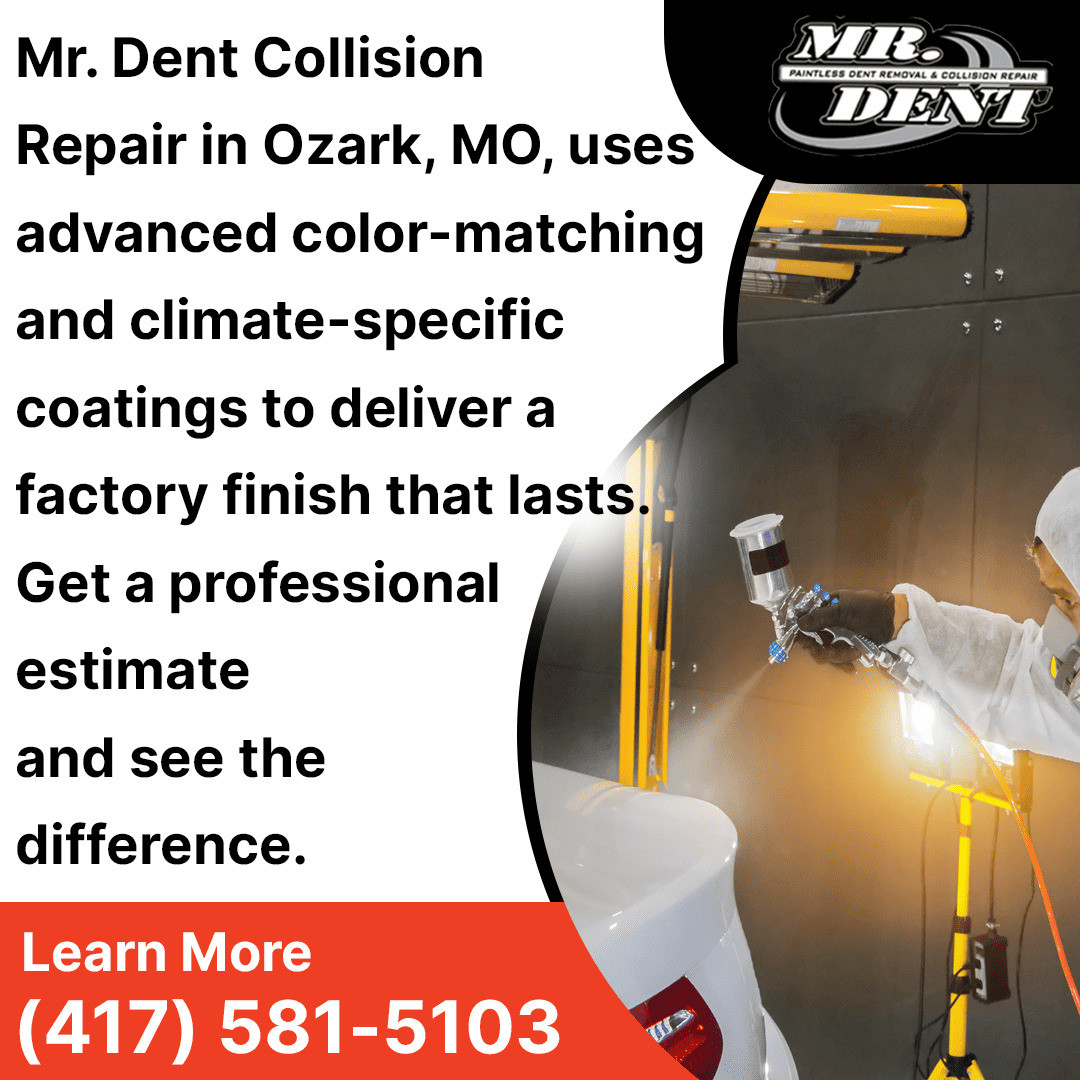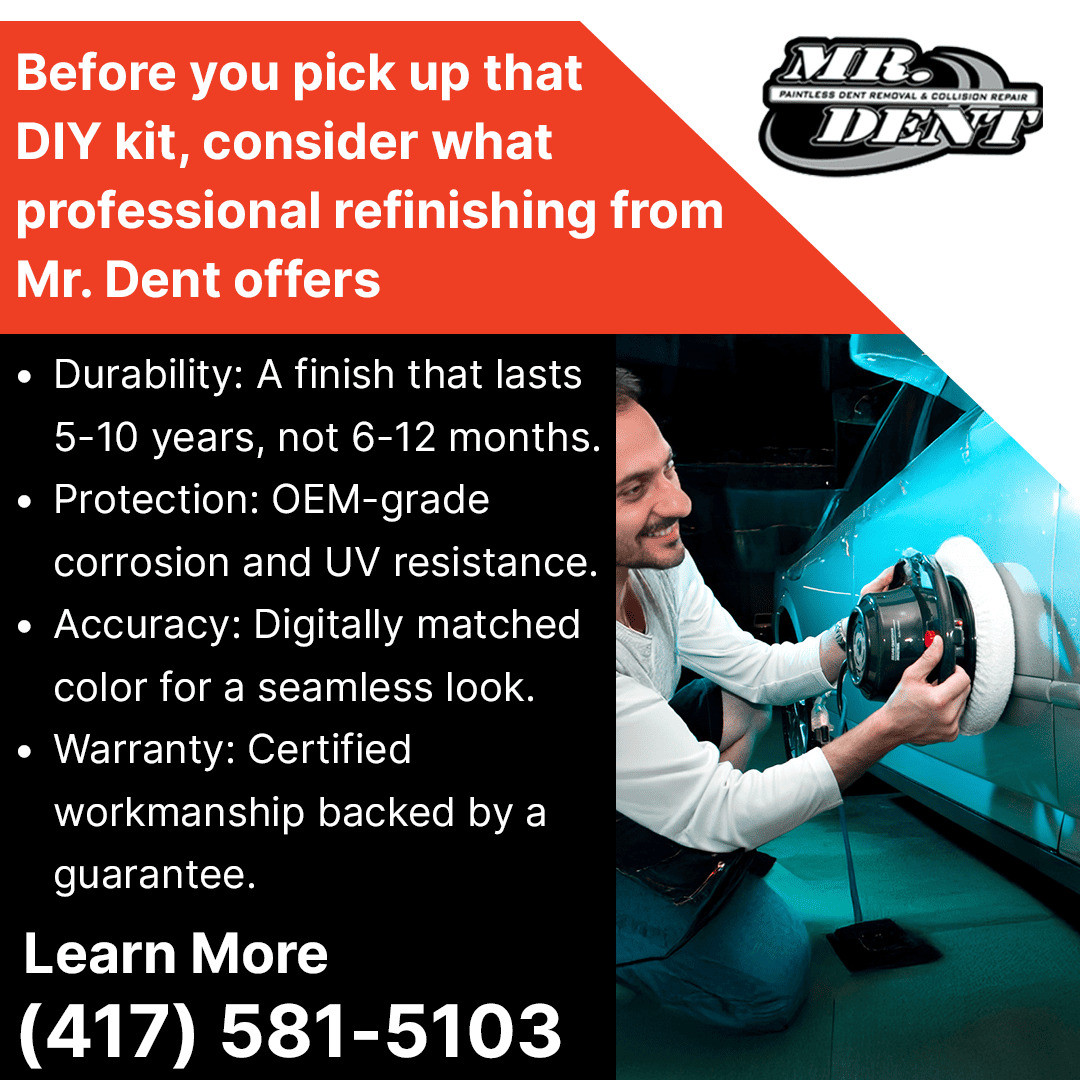Ozark, MO – Vehicle owners across Christian County now have access to comprehensive data comparing professional automotive paint restoration with do-it-yourself repair methods, revealing significant differences in durability, protection, and long-term value. Professional refinishing delivered by certified collision repair centers, like Mr. Dent Collision Repair, involves multi-stage processes that extend far beyond basic color correction, combining advanced surface preparation, precision color-matching technology, and manufacturer-approved coatings to restore both aesthetic appeal and structural protection.
Certified Refinishing Process Outperforms Consumer-Grade Solutions
Professional automotive paint restoration follows manufacturer-approved standards through controlled environments and specialized equipment not available in residential settings. The process includes surface evaluation using calibrated lighting, complete oxidation removal, epoxy primer application for corrosion resistance, and digital color matching through PPG systems that analyze paint tone and formulate exact replicas.
Temperature-controlled Garmat downdraft booths prevent contamination while distributing heat evenly during application and curing phases. OEM-approved coatings provide weather resistance calibrated for regional conditions, including Missouri's seasonal temperature extremes and winter road salt exposure.
Key advantages of certified facilities include:
- Digital color-matching cameras that adjust for paint aging and UV exposure
- Controlled booth environments, maintaining optimum temperature and humidity
- I-CAR Gold Class technician training, ensuring compliance with safety standards
- Film gauge verification, confirming proper thickness and curing
- EPA-compliant disposal and handling procedures
Southwest Missouri Climate Demands Professional-Grade Protection
Local conditions across Ozark and Christian County accelerate paint deterioration when surfaces lack adequate protection. Hot summers cause expansion and oxidation, while winter road salt and humidity drive corrosion in improperly sealed surfaces.
Professional refinishing addresses these challenges through UV-resistant clear coats, moisture-resistant primers, and comprehensive sealing of edges, seams, and wheel arches. Vehicles frequently exposed to highway conditions on routes like US-65 experience measurably longer finish retention with certified restoration compared to DIY applications.
Comparative Analysis Reveals Substantial Performance Gaps
Data comparing DIY paint repair with professional refinishing from certified collision repair centers demonstrates clear differences across multiple performance categories:
Feature | DIY Paint Repair | Professional Refinishing |
Average Cost | $75–$200 | $800–$2,000 per panel |
Color Accuracy | Approximate | Digitally matched and blended |
Preparation Quality | Minimal sanding | Complete surface correction |
Durability | 6–12 months | 5–10 years |
Finish Smoothness | Visible texture | Mirror-like gloss |
Protection | Little to no UV resistance | OEM-grade corrosion and UV protection |
Environment | Open garage | Controlled Garmat booth |
Warranty | None | Backed by certified workmanship |
DIY methods may address minor cosmetic concerns temporarily, but typically lack the precision and longevity required for long-term protection. Color mismatch, contamination from uncontrolled environments, and weak protection formulas lead to premature wear, often requiring professional correction within months.
Technical Specifications Define Quality Standards
Certified collision repair shops maintain strict operational guidelines through documented procedures covering materials selection, booth temperature control, humidity monitoring, and film thickness verification. Technicians complete I-CAR Gold Class training programs to ensure compliance with OEM refinishing standards.
Professional facilities use PPG digital color-matching systems, industry-grade spray equipment, and manufacturer-approved coating products designed for specific durability requirements. This structured approach delivers consistent results backed by written warranties against fading, peeling, and discoloration.
When DIY Solutions May Be Appropriate
Limited scenarios exist where DIY paint repair provides acceptable short-term results:
- Small chips not exposing primer or bare metal
- Very light scratches confined to clear coat layers
- Temporary cosmetic coverage on older vehicles awaiting trade-in
However, when rust appears or damage reaches metal surfaces, professional refinishing from certified specialists like Mr. Dent Collision Repair becomes necessary to prevent accelerated corrosion and structural compromise.
Investment Protection Through Proper Maintenance
Vehicle owners who select professional refinishing can extend finish life through regular care protocols, including weekly washing with pH-balanced products, avoiding automated brush systems, applying protective wax or sealant quarterly, utilizing shaded parking when possible, and addressing new chips immediately before corrosion develops.
Professional refinishing typically costs between $800 and $1,200 for single-panel repair, with full repaints ranging from $3,000 to $5,000 depending on vehicle size and preparation complexity. While initial investment exceeds DIY product costs, certified work adds measurable resale value and eliminates repeated repair expenses.
Local Expertise Serves Christian County Vehicle Owners
Mr. Dent Collision Repair operates as a certified facility in Ozark, MO, providing professional automotive paint restoration using OEM materials, PPG color-matching technology, and controlled-booth application methods. The facility serves Christian County with I-CAR-certified technicians trained in manufacturer-approved refinishing standards.
Vehicle owners seeking professional consultation can contact Mr. Dent Collision Repair at (417) 581-5103 to schedule an inspection and receive detailed estimates for refinishing projects.
The facility combines regional experience with factory-quality standards, understanding how local climate conditions affect coating performance and longevity across Southwest Missouri.





